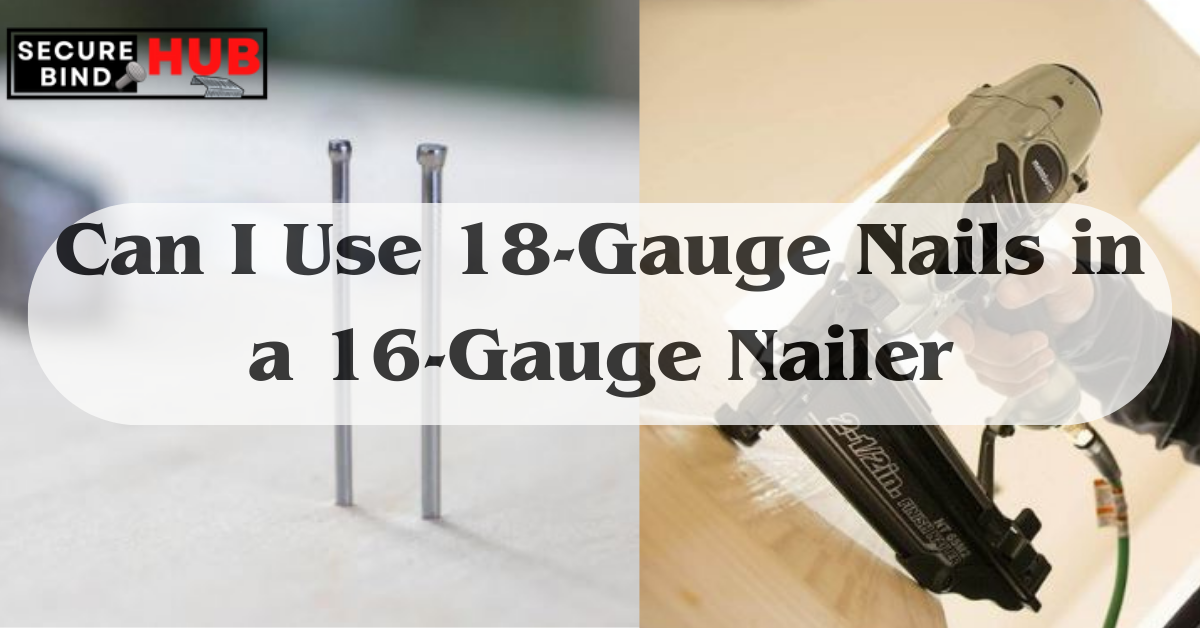Using the right nail size with your nailer is essential for a successful and safe DIY or construction project. One common question that arises is, “Can I use 18-gauge nails in a 16-gauge nailer?” In this article, we’ll dive deep into this topic, providing you with a comprehensive guide on nail sizes, compatibility, benefits, and potential risks. So, if you’re a DIY enthusiast or a professional in the construction industry, keep reading to learn everything you need to know about using 18-gauge nails in a 16-gauge nailer.
Can I Use 18-Gauge Nails in a 16-Gauge Nailer?

Yes, you can use 18-gauge nails in a 16-gauge nailer, but there are some important factors to consider before doing so. While it is possible, it’s crucial to understand the implications of using nails that are smaller in diameter than the nailer’s recommended size. Let’s explore this in more detail.
Compatibility Matters
Understanding Nail Gauges
Before we proceed, let’s clarify the concept of nail gauges. The gauge of a nail refers to its thickness, with smaller gauge numbers indicating thicker nails. In this case, 16-gauge nails are thicker than 18-gauge nails. While 16-gauge nails are more commonly used with 16-gauge nailers, the slightly thinner 18-gauge nails can technically fit.
Nail Length and Angle
When using 18-gauge nails in a 16-gauge nailer, the nail length and angle should be considered. 16-gauge nailers are designed to accommodate longer nails with a specific angle. Using shorter 18-gauge nails might affect the nailer’s performance and the integrity of the connection between the materials you’re fastening.
Nail Jams and Misfires
Using nails that are not recommended for your nailer can increase the likelihood of nail jams and misfires. The mechanisms and features of 16-gauge nailers are optimized for their corresponding nail sizes. Introducing smaller nails could disrupt the smooth operation of the nailer and lead to frustrating delays in your project.
Benefits of Using Recommended Nail Sizes
Using the right nail size offers several benefits that contribute to the overall success of your project:
- Stronger Connections: Nails with the recommended diameter create stronger and more secure connections between materials.
- Reduced Risk of Splitting: Properly sized nails reduce the risk of splitting wood or other materials when driven in.
- Optimal Performance: Nailers are designed to work optimally with specific nail sizes, resulting in fewer jams and smoother operation.
Risks of Using Incompatible Nail Sizes
While using 18-gauge nails in a 16-gauge nailer is possible, it comes with certain risks:
- Weak Connections: Thinner nails might not provide the same level of holding power as thicker ones, leading to weaker connections.
- Project Compromises: Incompatible nail sizes could compromise the structural integrity of your project over time.
- Tool Wear and Tear: The nailer’s internal components might experience increased wear and tear due to the use of smaller nails.
Expert Tips for Nailing Success
To ensure successful nailing and a long-lasting project, consider the following tips:
- Follow Manufacturer Guidelines: Always adhere to the nailer manufacturer’s recommendations for nail sizes and types.
- Choose the Right Nail Size: Select the nail size that matches your project’s requirements, taking material thickness and intended use into account.
- Perform Test Runs: Before committing to a large project, perform test runs with different nail sizes to assess compatibility and performance.
- Inspect Regularly: Regularly inspect your nailer for signs of wear and damage, and replace any worn-out parts promptly.
Frequently Asked Questions
Can I use 16-gauge nails in an 18-gauge nailer?
No, using thicker nails in a thinner nailer is not recommended. It can lead to jamming, misfiring, and potentially damage the nailer
Are there any projects where I can interchange nail sizes?
Certain projects may allow for interchangeability based on load requirements and material types. However, it’s best to stick to recommended nail sizes for optimal results.
What’s the advantage of using an 18-gauge nailer?
An 18-gauge nailer is ideal for projects where smaller, less noticeable holes are preferred. It’s commonly used for finish work and delicate trim.
Can using the wrong nail size void my tool’s warranty?
Yes, using nails that are not recommended by the manufacturer can void your tool’s warranty. Always use the specified nail sizes to maintain warranty coverage.
How do I know which nail size to use for my project?
Refer to your project plans or consult with experts in the industry to determine the appropriate nail size based on the materials, load requirements, and desired outcome.
Is it worth investing in both 16-gauge and 18-gauge nailers?
If you frequently undertake a variety of projects, investing in both nailers can provide versatility and ensure you have the right tool for the job.
In The End
In the world of nailers and nails, using the right size matters. While you can technically use 18-gauge nails in a 16-gauge nailer, it’s not without its challenges and potential risks. To ensure strong connections, optimal performance, and the longevity of your projects, it’s recommended to stick to the manufacturer’s guidelines for nail sizes. Whether you’re framing, finishing, or crafting, choosing the appropriate nail size is a small step that makes a big difference in the quality and durability of your work.

